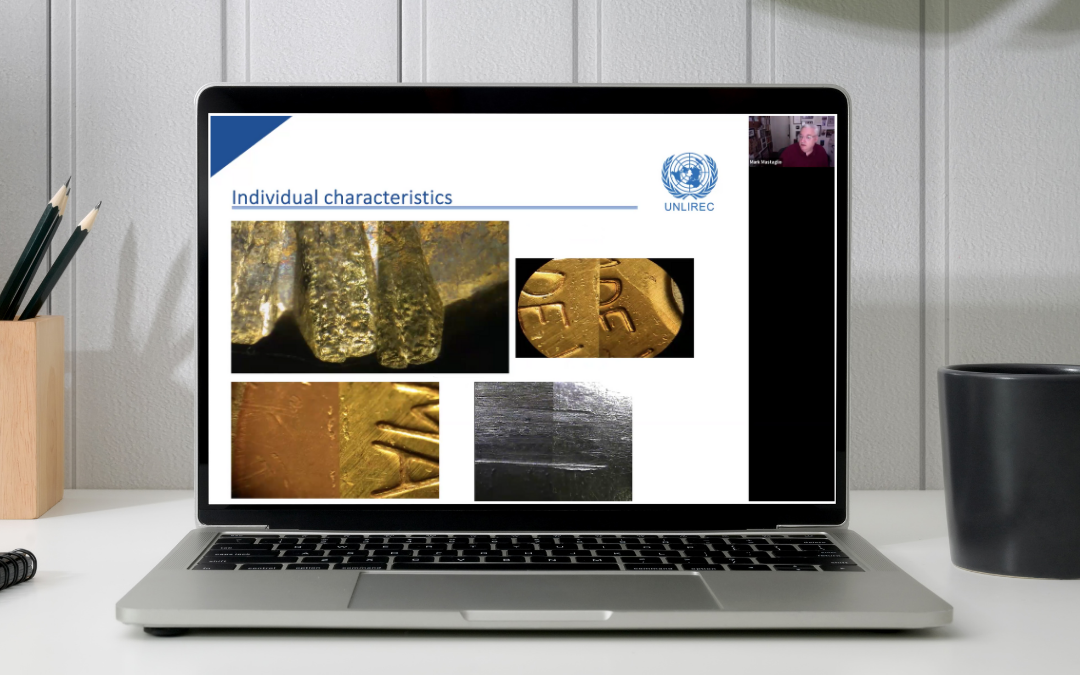
Oct 14, 2024 | Uncategorized
October 2024. In an effort to strengthen forensic ballistics capabilities across the Caribbean, the United Nations Regional Centre for Peace, Disarmament and Development in Latin America and the Caribbean (UNLIREC) undertook two webinars aimed at bolstering firearms examination and forensic ballistics competencies among police officers and forensic experts from Antigua and Barbuda and Saint Kitts and Nevis.
The two webinars form part of the twelve month “Operational Forensic Ballistics” capacity building programme for both States and took place in October. A total of 12 participants, including police officers, forensic scientist, military personnel and firearms experts, took part in both sessions. The webinars and the wider Operational Forensics Ballistics assistance programme are funded by the Government of Canada.
The first webinar focused on Introduction to Firearms Examination, providing participants with a foundational understanding of ballistics, safety procedures at crime scenes and laboratories and the principles of forensic ballistics investigations among other topics. The second webinar introduced participants to Comparison Microscopy, which is vital for firearms and ammunition examination, comparison, and establishing (or disproving) connections between firearms, ammunition and crime scenes.
The overall objective of the webinar series was to enhance the knowledge and skills of personnel involved in forensic firearms investigations. To this end, the webinars aimed to familiarise participants with the various methods used in forensic ballistics, firearm examinations; reinforce the importance of safety protocols in forensic investigations; and introduce forensic ballistic identification techniques, especially through the use of comparison microscopy.
The programme will continue in the coming months, with further training, equipment provision, and operational support. This initiative is part of UNLIREC’s technical assistance to Caribbean States, aimed at strengthening the expertise of firearms examiners.
The training aligns with the Caribbean Firearms Roadmap, particularly Goal 3: Bolstering law enforcement capacity to combat illicit firearms trafficking. It also supports the 2030 Agenda for Sustainable Development, specifically Target 16.4 on reducing illicit arms flows.
UNLIREC remains committed to providing Caribbean States with the tools and expertise needed to combat firearms-related crime and enhance public safety.

May 10, 2024 | Uncategorized
NEW YORK, 10 May (Office for Disarmament Affairs) — On the occasion of the International Day of Multilateralism and Diplomacy for Peace and Spanish Language Day, the United Nations Regional Centre for Peace, Disarmament and Development in Latin America and the Caribbean (UNLIREC) launched the first edition of GenerAcción Paz: building dreams, disarming violence (GenerAcción Paz: armando sueños, desarmando la violencia), which aspires to empower young people to create a region free of armed violence.
The call is aimed at Spanish speakers between the ages of 18 and 29 living in Latin America and the Caribbean. Young people from diverse academic or professional backgrounds are invited to apply. Ten standout participants will be selected on the basis of their active participation in youth networks or associations, their organizational and leadership skills, as well as their interests and initiatives to promote a region free of armed violence.
“It is crucial to recognize the role of Latin American and Caribbean youth as agents of change,” said Soledad Urruela, Director of UNLIREC. “Their ability to raise awareness, mobilize resources and promote peace is an invaluable asset in driving positive and lasting change in their communities.”
The programme, which will span a nine-month period from July 2024 to March 2025, is comprised of three stages: an online training component, a sponsored study visit to Lima (Peru), and for the selected participants to develop and implement projects aimed at reducing armed violence in the region. Throughout, participants will have the opportunity to interact with experts in armed violence prevention and sustainable development, participate in regional workshops, and develop innovative projects to raise awareness and promote change towards a more peaceful and secure region from within their communities.
The application process opened on 24 April and runs through 31 May. More information about the programme and an application form is available on UNLIREC’s dedicated website at unlirec.org/publicacion/generaccion-paz/.
The GenerAcción Paz: building dreams, disarming violence programme is the first of its kind to be conducted exclusively in Spanish and will provide young people with the tools, support and knowledge they need to turn their ideas and energy into concrete projects that can inspire other Latin American and Caribbean youth.
The GenerAcción Paz programme is in line with General Assembly resolutions on youth, peace and disarmament, as well as the 2030 Agenda for Sustainable Development. This pioneering project is funded by the United Nations Trust Support Service for Arms Regulation Cooperation and hopes to become a significant milestone in empowering a new generation of young people committed to peace and security in the region.
For more information, please contact: Soledad Urruela at urruela@unlirec.org or Elena Batani at batani@unlirec.org.
Dec 3, 2021 | Uncategorized
On 3 December 2021, in collaboration with the Ministry of Defense of Argentina, UNLIREC held a virtual workshop on physical Security, storage and management of firearms and ammunition for over 142 Argentinian officials from the defense sector, with responsibilities on stockpile management.
The workshop strengthened national capacities for an effective and safe stockpile management given the impact of the proliferation and diversion of firearms and ammunition on armed violence and illicit trafficking in the region.
UNLIREC shared international standards and good practices on stockpile risk management and security plans, as well as presented self-assessments templates for firearms and ammunition stockpiles developed by UNLIREC based on international technical guidelines such as IATG and MOSAIC regarding physical security aspects, storage and management of firearms and ammunition, in order to provide the defense sector a self-assessment tool that contributes to strengthening its stockpile management procedures.
During the workshop, UNLIREC highlighted the importance of developing periodic risk assessments and having standardized operating procedures for effective management of firearms and ammunition. Likewise, efficient stockpile management is an essential component of any arms and ammunition control programme. It assists in detecting loss or theft of firearms and ammunition from stockpiles and facilitates the identification and disposal of surplus weapons.
This virtual workshop forms part of UNLIREC’s “Combatting Illicit Firearms and Ammunition trafficking in Latin America and the Caribbean” project and was made possible thanks to the financial support of the Government of Germany. For more information on UNLIREC, visit www.unlirec.org. Please direct all questions or inquiries to Ms. Amanda Cowl, Political Affairs Officer at cowl@unlirec.org.
Nov 16, 2021 | Uncategorized
As part of the project on “Combatting Illicit Firearms and Ammunition trafficking in Latin America and the Caribbean”, UNLIREC offered a two-day virtual workshop on measures to prevent the illicit trafficking in firearms and ammunition in collaboration with the Ministry of Foreign Affairs of Honduras.
The purpose of the workshop was to strengthen national capacities to prevent and combat illicit firearms and ammunition trafficking by providing context-specific information, tools for ballistic data collection and analysis, as well as a presentation of existing international cooperation mechanisms.
The workshop was aimed at criminal investigators, forensic analysts, ballistic experts, intelligence agents, international arms transfers control officers, customs, public prosecutor’s office and other institutions that contribute to the fight against trafficking illicit arms in Honduras. It was attended by close to 40 Honduran representatives (9 women) of national institutions involved in investigating and prosecuting offences committed with firearms.
The first set of presentations were given by UNLIREC, the Central American Integration System (SICA), and the Police of Honduras. They gave participants an overview of the regional, sub-regional and national context of illicit trafficking of firearms, including specific trends, modus operandi, routes, and challenges.
The second set of presentations were given by UNLIREC and the UK National Ballistics Intelligence Service. These provided information and research tools to strengthen intelligence processes through data collection and analysis on cases of illicit arms trafficking and crimes committed with firearms. It was complemented by a presentation on international cooperation mechanisms to prevent and reduce illicit flows of firearms.
The workshop contributed to bringing together national agencies involved in preventing illicit trafficking in firearms and ammunition and highlighted the importance of multi-sectoral coordination and cooperation among national agencies.
This virtual workshop was possible thanks to the financial support of the Government of Germany. For more information on UNLIREC, visit www.unlirec.org. Please direct all questions or inquiries to Ms. Amanda Cowl, Political Affairs Officer at cowl@unlirec.org.
Oct 28, 2021 | Uncategorized
On 28 October 2021, in collaboration with the Ministry of Defense of Argentina, UNLIREC held a virtual workshop on managing and controlling firearms and ammunition inventories for over 80 Argentinian officials from the defense sector, with responsibilities on stockpile management.
The workshop strengthened national capacities for an effective and safe stockpile management given the impact of the proliferation and diversion of firearms and ammunition on armed violence and illicit trafficking in the region.
UNLIREC presented best practices and international technical guidelines on stockpile and inventory management, with an emphasis on accounting, registers, stock checks, separation of powers and notification of losses and investigations.
During the workshop, UNLIREC highlighted the relevance of the implementation of inventory management measures as a fundamental component of stockpile management, which assists in detecting loss or theft of firearms and ammunition from stockpiles and facilitates the identification and disposal of surplus weapons.
Representatives of the Argentinean Army presented the inventory control measures implemented in the defense sector in areas such as the requirement of firearms and ammunition, trade, storage, distribution, and final disposal. Likewise, they presented an inventory management system that controls firearms and ammunition stocks, including the option to get stock reports in cases where weapons and ammunition are removed from stockpiles.
This virtual workshop forms part of UNLIREC’s “Combatting Illicit Firearms and Ammunition trafficking in Latin America and the Caribbean” project and was made possible thanks to the financial support of the Government of Germany. For more information on UNLIREC, visit www.unlirec.org. Please direct all questions or inquiries to Ms. Amanda Cowl, Political Affairs Officer at cowl@unlirec.org.
Oct 21, 2021 | Uncategorized
On 21 October 2021, the United Nations Regional Centre for Peace, Disarmament and Development in Latin America and the Caribbean (UNLIREC), in collaboration with the Government of Antigua and Barbuda, hosted an online National Tracing Workshop and Roundtable Meeting.
In the Caribbean, thousands of illicit firearms are seized annually. However, not all illicit firearms are traced to identify their last known legal owners. Ineffective procedures and the absence of serial numbers on firearms are factors that hinder the ability of States to trace firearms recovered. These challenges are by the Caribbean Firearms Roadmap, which Antigua and Barbuda have adopted. In this sense, the National Tracing Workshop and Roundtable Meeting were developed to support the State’s efforts to trace firearms and implement the Caribbean Firearms Roadmap.
Over 20 national officials from the Royal Police Force of Antigua and Barbuda, the Customs and Excise, Antigua and Barbuda Forensic Services, the Office of National Drug and Money Laundering Control Policy, the Ministry of Public Safety and Labour, and the Department of Immigration took part in the National Tracing Workshop and the Roundtable Meeting. Participants included operational police officers and analysts responsible for recovering illicit firearms, retrieving trace evidence, analysing firearm crime data, tracing firearms and collating information on criminal groups. The Workshop included presentations from UNLIREC, Antigua and Barbuda, and partners, including the United Kingdom’s National Ballistics Intelligence Service and the International Police Organization (INTERPOL).
The tracing workshop precedes a serial number restoration course that was undertaken for representatives of the Antigua and Barbuda Forensic Service and the Royal Police Force to enhance the State’s capacity to successfully trace weapons. The workshop and the roundtable meeting were made possible thanks to the financial support from the Federal Republic of Germany.
UNLIREC, as the regional organ of the UN Office for Disarmament, seeks to advance the cause of practical disarmament in Latin America and the Caribbean as part of its commitment to support Member States in their implementation of international disarmament and non-proliferation instruments, in particular, the 2001 UN Programme of Action on Small Arms.
Página 2 de 64«12345...102030...»Última »


